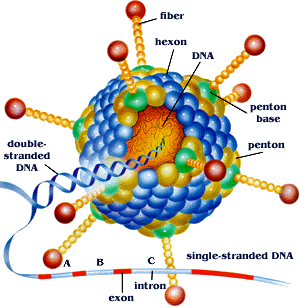

Picture courtesy of nobelprize.org.
Basic Information and Interesting Characteristics
• Double-stranded DNA virus, medium sized, monopartite
genome (36 kb)
• Icosahedral capsid (T=25, 70-90 nm diameter), non-enveloped
• 12 penton glycoprotein fibers (“spikes”) attached to vertices
of capsid. These spikes are toxic and aid in the binding of virus to receptor.
• Unique protein covalently bonded to the 5’ end of the genome.
This protein acts as a primer so that the DNA polymerase can start from the
very end of the genome (thereby solving the “tip problem”
• Naked DNA is infectious
• Multiple promoters creates kinetic classes of proteins
• Can only replicate in actively dividing cells
• Can potentially be used as a vector for gene therapy or cancer treatment
• Infects the membranes of the respiratory tract, eyes, intestines, and
urinary tract
• Is responsible for 10% of acute respiratory infections in young children